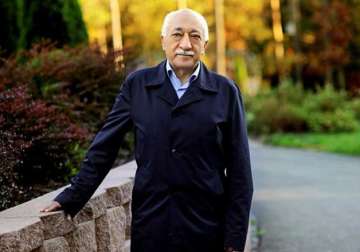Turkey accuses US-based cleric Fethullah Gulen of instigating coup attempt
Fethullah Gulen, the US-based Muslim cleric has been accused by Ankara of orchestrating the coup attempt in Turkey.
Ankara: Fethullah Gulen, the US-based Muslim cleric has been accused by Ankara of orchestrating the coup attempt in Turkey.
A lawyer for the Turkish government, Robert Amsterdam, said that there are indications of direct involvement in the coup attempt by Gulen, who is living in exile in Pennsylvania.
The official said that Gulen and his firm have attempted repeatedly to warn the US government of the threat posed by Gulen and his movement.
“There are signs that Gulen is working closely with certain members of military leadership against the elected civilian government,” he said.
Gulen (75) was once a close ally of President Recep Tayyip Erdogan but the two fell out in recent years. He moved to the United States in 1999, before he was charged with treason in his native country.
Gulen’s movement, however, denied involvement, saying in a statement that it was committed to democracy and was opposed to any military intervention.
“We categorically deny such accusations and find them to be highly irresponsible,” a group that promotes Gulen's ideas, the New York-based Alliance for Shared Values, said in a statement.
WHO IS FETHULLAH GULEN?
Trained as an imam, or prayer leader, Fethullah Gulen gained notice in Turkey some 50 years ago, promoting a philosophy that blended a mystical form of Islam with staunch advocacy of democracy, education, science and interfaith dialogue. Supporters started 1,000 schools in more than 100 countries, including about 150 taxpayer-funded charter schools throughout the U.S. In Turkey, they have run universities, hospitals, charities, a bank and a large media empire with newspapers and radio and TV stations.
Turkish President Recip Tayyip Erdogan has long accused Gulen of plotting to overthrow the officially secular government from a gated 26-acre compound in Pennsylvania's Pocono Mountains. Gulen is rarely seen in public and has been put on trial in absentia at least three times.
WHY NOT DEPORT HIM?
The U.S. has shown little inclination to send Gulen back to Turkey. The Justice Department has declined to comment on Gulen's case. In an interview with the AP early this year, Aslandogan, of the Alliance for Shared Values, said: "(Gulen) said that the United States has a long tradition of democracy and rule of law. ... They will see that these are politically oriented charges, and they will not allow Erdogan to spread his ambition into the United States."
WHAT'S THE STATUS OF LEGAL CLAIMS AGAINST GULEN IN THE U.S.?
Last month, a lawyer representing the Turkish government said he would continue exposing Gulen's "unlawful conduct" one day after a federal judge in Scranton, Pennsylvania, dismissed his lawsuit against the cleric. "Despite the outcome of this ruling, a very clear message has been sent to Gulen and his co-conspirators in the Poconos: the days of impunity are numbered, and your unlawful conduct will be brought to light," lawyer Robert Amsterdam said. The suit contended Gulen ordered sympathetic police, prosecutors and judges in Turkey to target members of a rival spiritual movement critical of his teachings. U.S. District Judge Robert Mariani ruled the claims did not belong in U.S. courts.
WHAT ABOUT THE SCHOOLS?
Some of the U.S. schools have been investigated by the FBI amid allegations of financial mismanagement and visa fraud. One of the most explosive claims is that the schools are importing Turkish teachers to identify impressionable students and indoctrinate them into Gulen's movement, sometimes called Hizmet, Turkish for "service." In May, a complaint filed with Texas education officials accused a network of charter schools associated with the Gulen movement of abusing a visa program to import large numbers of Turkish teachers and violating state and federal laws by paying them more than American teachers.
The complaint also asserted that the network, Harmony Public Schools, skirts competitive bidding rules to award contracts to Turkish vendors. Harmony has denounced the complaint as politically motivated and without merit.
WHAT'S THE RESPONSE TO THE LATEST ALLEGATIONS?
In a statement Friday, the Alliance for Shared Values said: "For more than 40 years, Fethullah Gulen and Hizmet participants have advocated for, and demonstrated their commitment to, peace and democracy. We have consistently denounced military interventions in domestic politics. These are core values of Hizmet participants. We condemn any military intervention in domestic politics of Turkey. Events on the ground are moving quickly and it would be irresponsible for us to speculate on them. We remain concerned about the safety and security of Turkish citizens and those in Turkey right now. Comments by pro-Erdogan circles about the movement are highly irresponsible."
WHAT ARE GULEN'S DAYS LIKE?
An AP reporter was given a tour of Gulen's Pennsylvania compound this year but was unable to see or interview him. He spends hours a day in prayer and meditation and goes out rarely, mostly to see doctors for ailments that include heart disease and diabetes, according to Aslandogan. Gulen's living quarters are lined with books on shelves that also hold jars filled with soil from various regions of Turkey.
With AP Inputs
